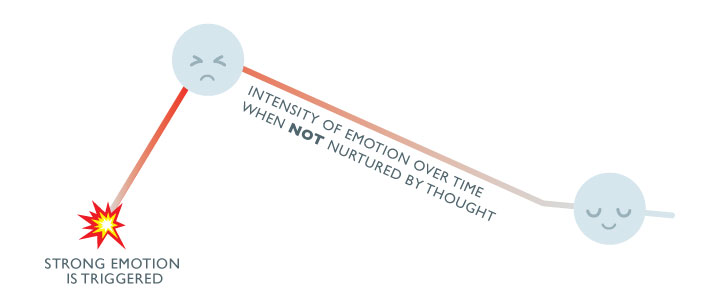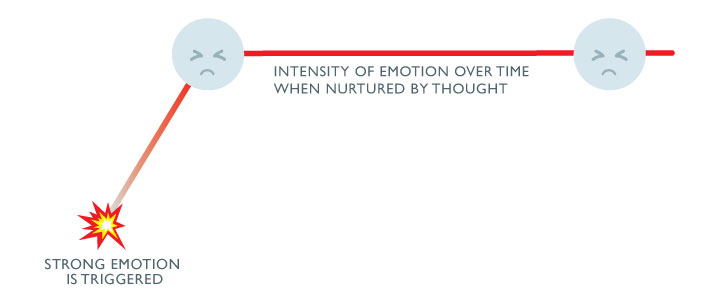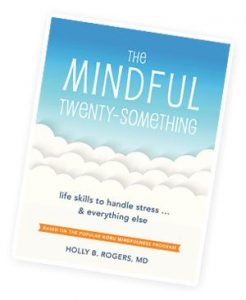
Remember the last time you got really pissed off? Did you find that the feeling followed you around for a long time? Have you ever had an argument or a disappointment ruin your whole day?
Why does that happen? Why is it that it can be so hard to shake off an unpleasant emotion?
For most of us, a strong feeling is followed by a torrent of thoughts about the feeling or the incident that triggered it. So if someone makes you angry, a flood of thoughts follows: He shouldn’t have done that. He’s totally wrong about that and next time I see him, I’m going to tell him….
That torrent of thoughts is fuel for your fiery feelings. The more the thoughts flow, the longer the feelings persist.
Alternatively, if you just leave a feeling alone, and by “alone” I mean just let it runs its course without feeding it with thoughts, it would look something like this:

It starts off with a rapid rise, it stays high for a bit, and then drifts back down.
That’s what emotions do. They are neurological phenomena, and they ramp up and dissipate, just like a summer thunderstorm.
You can make those feelings last longer, though, if you feed them.
Like gasoline on a fire, your thoughts can keep your feelings flaming.
You can feed a feeling by:
- Rehashing in your head over and over the events that triggered the feeling.
- Rehearsing in your head over and over what you are going to say or do next time.
- Justifying to yourself over and over why you are right and everyone else is wrong.
Thus, if you feed an emotion with thoughts, this is what it will look like:

You can make any emotion last a good long time if you just keep feeding it.
Of course, it’s not just strong, unpleasant emotions that work this way. You can also extend your pleasant emotions the same way.
Sometimes we want to delight in a wonderful feeling for awhile. By revisiting it in your mind, you can rekindle the pleasure of a first kiss with someone special. Or the feeling of pride after winning a hard fought competition.
Sometimes it is helpful to sustain an emotion, but sometimes it is downright destructive. Getting more aware of your emotions will allow you to skillfully choose when to feed a feeling and when to let it run its natural course.
We’re now on Instagram and Snapchat! Make sure to connect with us for tips and inspiration!
What is an emotion, anyway?
If you take away the thoughts about an emotion, what is left?
How do you know you are having a feeling? How do you know what that feeling it is?
You can discover the answer to these questions by getting more familiar with the ways emotions register in your body. The more familiar you are with them, the more skillfully you will manage them when they emerge, and the less you will feel overwhelmed and out of control when strong feelings arise.
If you are angry, you might notice that your fists are clenched and there is tightness in your chest and maybe heat in your face.
If you are jealous, maybe you feel a knot in your stomach and muscle tension in your jaws and shoulders.
If you are joyful, perhaps you feel light and fluttery or restless with butterflies in your stomach.
It’s actually quite interesting to start getting to know your feelings in this way, learning how they live in your body if you separate out all the thoughts about them.

So next time you are in the grip of a strong emotion, get curious about how it feels in your body. Breathe slowly and deeply. Discover where you can feel the emotion in your body and see how long you can continue to detect the sensations. Notice if they feel pleasant or unpleasant, but try not to judge yourself for having the experience. Leave out the “I shouldn’t be feeling this way.”
Notice all the thoughts in your head about the emotion or the incident that triggered it; then, as best you can, shift your attention to the body sensations produced by the emotion.
This is the key. Remember, when your mind is obsessing or dwelling, don’t struggle with the thoughts or get caught up in judgment. Simply move your awareness to body sensations. If the thoughts are persistent, you will likely have to do this over and over. But that’s ok. Just stay curious about the sensations and see how long you can detect them.
Use the comments section below to let us know what happens when you begin to work with your feelings in this way .
Photo by Manuel Meurisse on Unsplash
Get our latest articles in your inbox.

Trying to manage or understand my emotions definitely takes up so much of my time, and it’s hard to keep my energy up. I do things like exercise regularly, eat healthily and get lots of sleep, so overthinking has to be at the root of my problem… I’ve had a lot of obstacles to overcome in life that I have let control me because my thoughts run around them so often (angry at the “culprits” who I blame and wondering if I’ll ever be “normal” like I could/would have been had those events never taken place). I think so much, that I accomplish half of what I wish I could in a day and feel drained quite often… all those “thoughts” as you mentioned do take me down some rabbit holes, especially when dealing with situations that cause insecurity and/or fear in some way. However, it’s my instantaneous physical responses to feelings that “hit me” that I would really like to get a handle on. When you mention just noticing the effects of the emotion in the body, what would be a good next step to really help calm down? Just try to “not think”? I find that I can have panic attacks very easily ever since adolescents, especially in social situations when I feel all of the attention shifting towards me. I want to run and hide instead of feeling confident within myself. It keeps me from trying new things because the automatic fear response is so strong at times and I get so embarrassed by it. How do you calm an overactive and irrational fearful response so that you don’t have to then beat yourself up about becoming so obviously uncomfortable in front of others? It doesn’t make any sense. Sometimes I’m golden, but usually, I’m just way too sensitive! Help!
When we have strong feelings, particularly when they trigger physical responses like pounding heart or knots in our stomach, it is really, really hard to just let them go. And trying to “not think” hardly ever works. I think of training the mind to handle these strong, painful feelings like training your body to lift heavy weights. You have to work out a long time, starting with smaller weights, before you can finally lift a 200 pound weight. The kind of feelings you are describing are like 200 pound weights that you will one day be able to manage with mindfulness but you have to practice a long time with lighter “weights” first. A light weight to start with is 10 minutes of meditation practice in a quiet space when you are relatively calm. Over time, you can work up to staying grounded when heavy, emotional weights come your way. In the mean time, I’d suggest finding a therapist or counselor to meet with a few times. It can make a huge difference to talk with someone who is trained in managing difficult emotions and situations. They can act like a guide for you, helping to lead you away from your worries and regrets and into a more comfortable, safe space.
Thanks to this essay. It really helps me.
I recently had my laptop breakdown, and I was unable to get it repaired. The problem is that the deadline for thesis deadline is approaching, and I have stored all my data in my laptop. I feel very frustrated about it. This emotion lasted long for the whole weekend, but I realized it was meaningless.